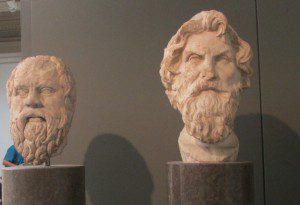From Conor Friedersdorf:
What this shows is that some see public education as social engineering, and what it also shows is that some want freedom to educate as they believe, and that diversity is a good for society.
What do you see here?
In a controversial Slate article published last week, the talented education journalist Dana Goldstein laments what she says is the go-it-alone ideology of home-schooling parents, arguing that they harm children in the public school system and do society as a whole a disservice. “In a country increasingly separated by cultural chasms–Christian conservatives vs. secular humanists; Tea Partiers vs. Occupiers–should we really encourage children to trust only their parents or those hand-selected by them,” she asks, “and to mistrust civic life and public institutions?”…
None of these objections explains why I am so antagonistic to the notion that everyone should join the public school system. I’m glad its there. I want it to be well-funded and substantially improved. I presume a majority of Americans will always attend public schools. But I value diversity more highly than Goldstein or Freddie deBoer, however often they invoke that same word. In their vision, kids from different races and classes should come together in public school system that everyone in America is invested in improving. I agree. But I want alternatives to exist too….
Would these different sorts of wisdom all survive if an increasingly centralized public school system operated as a monopoly? Aren’t we better off in a society that draws on folks who got different sorts of education? Some progressives seem to think a diverse society is one where every 14-year-old in America arrives at school, pledges allegiance to the nation’s flag, takes out an American history textbook shaped by panels of bureaucrats in California and Texas, and proceeds to be guided by a teacher with a state issued credential in how best to pass a standardized test. Who is celebrating diversity, the champions of putting every kid in the education wonk’s vision of the ideal classroom, or the folks who want some kids to start their day interacting with multi-ethnic classmates while others start their school day praying and still others learn about raising backyard chickens?
The final question is what sort of educational system is likely to produce the best results in the long run, or to be more specific, what system is best suited to evolving in advantageous ways. I’d bet on the diversified system, the one where there are always competitors with different models to measure public schools against. As Friedrich Hayek put it, there is value in “rules which are neither coercive nor deliberately imposed – rules which, though observing them is regarded as merit and though they will be observed by the majority, can be broken by individuals who feel that they have strong enough reasons to brave the censure of their fellows… Rules of this kind allow for gradual and experimental change. The existence of individuals and groups simultaneously observing partially different rules provides the opportunity for the selection of the more effective ones.” This philosophy suggests a different message for homeschooling parents than the one Goldstein offers. It might go something like this:
There is value in the public education system. Lots of intelligent, informed people have helped to shape its curriculum and norms. Consider their model with an open mind, and depart from it only after taking their claims seriously. And if you reach an informed conclusion that a different model is better, if that is your strong conviction, go out and be the change you want to see in the world. It may happen that you’re right or wrong, but society as a whole requires people who challenge the prevailing system if it is to identify the few who can offer new insights.
This approach ought to be particularly appealing to dissident cultural critics like deBoer, who generally see the value in dissent and radical critiques of prevailing norms. Why is education different?











